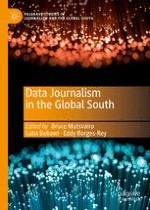2019 | OriginalPaper | Buchkapitel
3. Prospects for Data Journalism in Zimbabwe: Challenges of Engendering a Democratic Society and an Informed Citizenry in the Digital Age
verfasst von : Cleophas Taurai Muneri
Erschienen in: Data Journalism in the Global South
Verlag: Springer International Publishing
Aktivieren Sie unsere intelligente Suche, um passende Fachinhalte oder Patente zu finden.
Wählen Sie Textabschnitte aus um mit Künstlicher Intelligenz passenden Patente zu finden. powered by
Markieren Sie Textabschnitte, um KI-gestützt weitere passende Inhalte zu finden. powered by
